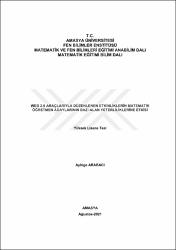| dc.contributor.advisor | Orbay, Keziban | |
| dc.contributor.author | Arabacı, Aybige | |
| dc.date.accessioned | 2022-03-09T14:56:27Z | |
| dc.date.available | 2022-03-09T14:56:27Z | |
| dc.date.issued | 2021 | |
| dc.identifier.uri | https://tez.yok.gov.tr/UlusalTezMerkezi/TezGoster?key=tqUiYt63sTQLTpozMJ92QqXNzwrTRlV3Dh7y3u2iUlXQ4RUvi_adEwhwQK-2Eo-H | |
| dc.identifier.uri | https://hdl.handle.net/20.500.12450/1970 | |
| dc.description.abstract | Bu çalışmanın amacı, 5E modeline uygun Web 2.0 araçları ile düzenlenen matematik öğretimi ders etkinlikleri tasarım deneyimlerinin öğretmen adaylarının teknolojik pedagojik alan yeterliği, öğretim teknolojilerine yönelik tutumu ve Web 2.0 araçlarıyla hızlı içerik geliştirme öz-yeterliği üzerindeki etkisini incelemektir. 2020-2021 eğitim-öğretim yılı güz döneminde ilköğretim matematik öğretmenliği programı 3. sınıfta öğrenim gören 33 öğretmen adayı ile gerçekleştirilen bu çalışmada karma araştırma desenlerinden iç-içe karma yöntem kullanılmıştır. Çalışmanın nicel boyutunda tek gruplu ön test-son test desen, nitel boyutunda ise durum çalışması yaklaşımı kullanılmıştır. Çalışma 10 hafta boyunca "Sayıların Öğretimi" dersi kapsamında yürütülmüştür. Bu kapsamda, uzaktan eğitim süresince öğretmen adaylarına matematik öğretiminin farklı aşamalarına hitap eden Web 2.0 araçlarının kullanımı, bu araçlar kullanılarak etkinliklerin nasıl oluşturulacağı ve oluşturulan etkinliklerin matematik öğretimine nasıl entegre edileceği hakkında bilgiler video aracılığıyla sunulmuştur. Bu sürecin sonunda öğretmen adaylarından Web 2.0 araçları entegreli 5E modelinde uygun ders planı hazırlamaları ve sunmaları istenmiştir. Çalışmada nicel veriler "Teknolojik Pedagojik Alan Bilgisi", "Web 2.0 Hızlı İçerik Geliştirmeye Yönelik Öz-Yeterlik" ve "Öğretim Teknolojilerine Yönelik Tutum" ölçekleri ile toplanmış ve analizi IBM-SPSS 20.00 programı ile yapılmıştır. Nitel veriler ise yapılandırılmış form ile toplanmış ve elde edilen veriler içerik analizi yöntemiyle çözümlenmiştir. Çalışma sonunda elde edilen nicel bulgulara göre, öğretmen adaylarının "Web 2.0 Araçlarıyla Hızlı İçerik Geliştirmeye Yönelik Öz-yeterlik" düzeyinde ve alt boyutlarından olan "hazırlık ve "değerlendirme" düzeylerinde istatistiksel olarak anlamlı artış olduğu belirlenmiştir. "Öğretim teknolojilerine yönelik tutum" düzeyinde anlamlı bir fark gözlenmemiş olmasına rağmen "derslerde öğretim teknolojilerini kullanımına inanma", "derslerde öğretim teknolojilerini kullanımından zevk alma" ve "öğretim teknolojilerini kullanımından zevk almama" alt boyutlarında istatistiksel olarak anlamlı farklar gözlenmiştir. Öğretmen adaylarının "Teknolojik pedagojik alan bilgisi" ve alt boyutlarının düzeylerinde istatistiksel olarak anlamlı bir artış görülmemiştir. Öğretmen adaylarının görüşleri doğrultusunda, kendilerini yeterli gördükleri araçların, yetersiz gördüğü araçlara göre daha fazla olduğu ve meslek yaşamlarında Web 2.0 araçlarını kullanma konusunda istekli olduğu sonucuna ulaşılmıştır. Çalışmanın öğretmen adaylarına, teknoloji entegrasyonu hakkında farkındalık kazandırdığı, matematik öğretiminde web 2.0 araçlarının kullanım şeklini öğrettiği, Web 2.0 araçları ile içerik üretebilmeyi sağladığı ve teknoloji kullanımı konusunda olumlu tutum, yeni bilgi ve beceri geliştirdiği sonucuna ulaşılmıştır. Öğretmen adaylarının etkinlik oluşturmada, soruları hazırlamada ve öğrencilere uygun anlatım yöntemini bulmada zorlandıkları sonucuna varılmıştır. | en_US |
| dc.description.abstract | The aim of this study is to investigate the effects of design experiences of mathematics teaching course activities organized with Web 2.0 tools in accordance with the 5E model on technological pedagogical content proficiency of teacher candidates', their attitudes towards instructional technologies, and their self-efficacy for rapid content development with Web 2.0 tools. This is a mixed-method study conducted by 33 teacher candidates studying in the 3rd year of the primary school mathematics teaching program during the fall semester of the 2020-2021 academic year. In the quantitative part of the study, a single-group pre-test-post-test design was used, and the case study approach in the qualitative part. The study was carried out within the scope of "Teaching Numbers" module during 10 weeks. In this context, information about the use of Web 2.0 tools that address different stages of mathematics teaching to teacher candidates during distance education, the way of creating activities using these tools and the integration of the created activities into mathematics teaching were presented via video records. At the end of this intervention, teacher candidates were asked to prepare and present a suitable lesson plan in the 5E model integrated with Web 2.0 tools. The quantitative data were collected using the "Technological Pedagogical Content Knowledge", "Web 2.0 Practical Content Development Self-Efficacy Belief" and "Attitudes Towards Instructional Technologies" scales, and then analyzed with using the IBM-SPSS 20.00 program. The qualitative data were collected with a structured form and analyzed based on content analysis method. According to the results of the quantitative part, there was a statistically significant increase in "Web 2.0 Practıcal Content Development Self-Effıcacy Belıef" and its sub-dimensions of, "preparation" and "evaluation" scores of teacher candidates. Although no significant difference was observed at the level of "attitude towards instructional technologies", statistically significant differences were observed in its sub-dimensions of ''belief regarding usage of instructional technology in lesson", " appreciation to usage of instructional technology in lesson " and "unappreciated using instructional technology". There was no statistically significant increase in the levels of teacher candidates' "Technological pedagogical content knowledge" and its sub-dimensions. Based on the teacher candidates' opinions, it was concluded that the tools they consider themselves sufficient with are more than the tools they consider themselves inadequate with and they are willing to use Web 2.0 tools in their professional life. It was concluded that the study increased the awareness of teacher candidates about integration of technology, taught the way of using Web 2.0 tools in mathematics teaching, enabled to produce content with Web 2.0 tools, and developed a positive attitude, new knowledge and skills about technology use. The study also concluded that teacher candidates had difficulties in creating activities, preparing questions and finding appropriate teaching methods for the students. | en_US |
| dc.language.iso | tur | en_US |
| dc.publisher | Amasya Üniversitesi | en_US |
| dc.rights | info:eu-repo/semantics/openAccess | en_US |
| dc.subject | Eğitim ve Öğretim | en_US |
| dc.subject | Education and Training | en_US |
| dc.title | Web 2.0 araçlarıyla düzenlenen etkinliklerin matematik öğretmen adaylarının bazı alan yeterliliklerine etkisi | en_US |
| dc.title.alternative | The effects of activities carried out with Web 2.0 tools on some field competencies of mathematics teacher candidates | en_US |
| dc.type | masterThesis | en_US |
| dc.department | Enstitüler, Fen Bilimleri Enstitüsü, Matematik ve Fen Bilimleri Eğitimi Ana Bilim Dalı | en_US |
| dc.identifier.startpage | 1 | en_US |
| dc.identifier.endpage | 120 | en_US |
| dc.relation.publicationcategory | Tez | en_US |
| dc.identifier.yoktezid | 694272 | en_US |
| dc.institutionauthor | Arabacı, Aybige | |


















